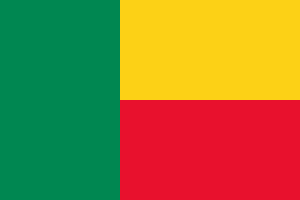Language/Fon/Grammar/Adjectives
Hi Fon learners! 😊
In this lesson, we will dive into one of the most exciting parts of Fon grammar - Adjectives! Adjectives help to describe or modify nouns, pronouns, or other adjectives in a sentence. They provide a more nuanced meaning to the sentence, making communication more precise.
Finish this lesson and explore these related pages: How to Use "Be", Plurals & Give your Opinion.
What are Adjectives?[edit | edit source]
Adjectives are words that modify, enhance or limit the meaning of nouns or pronouns in a sentence. They provide more vivid details about a noun, making the sentence more vivid and alive. Here are a few examples of adjectives in Fon:
| Fon | Pronunciation | English |
|---|---|---|
| agba | aɡba | big |
| agbon | aɡbõ | long |
| aluka | aluka | short |
| alɔbɔ | alɔbɔ | small |
In the table above, you can see that adjectives come in various forms and can be used to describe size, length, and even emotional states. Learning Fon adjectives will improve your communication skills and help you to better express yourself in Fon.
Placement of Adjectives[edit | edit source]
In Fon language, adjectives tend to come after the noun, unlike English where they come before the noun. For example, while in English we would say "the big tree", in Fon we would say "akɔ ta agba". In this example, "akɔ" means "tree" and "agba" means "big".
However, there are some exceptions to this rule when the adjective is used to denote color or shape. Then, it comes before the noun. For example, "abińkan tɔ" means "white shirt".
Comparison of Adjectives[edit | edit source]
Adjectives can also be used to compare or contrast two or more things. In Fon, the comparative form of an adjective is formed by adding the word "nun" at the end. Here is an example dialogue to illustrate:
- Person 1: "E gbon nun?" (Is it longer?)
- Person 2: "O e gbon nun" (Yes, it is longer.)
In the same vein, the superlative form of an adjective is formed by adding the word "gbé" at the end. Here is an example dialogue illustrating the superlative usage:
- Person 1: "E wé gbé?" (Which is the smallest?)
- Person 2: "Amagan wé gbé." (The ant is the smallest.)
Interesting Facts[edit | edit source]
Did you know that Fon language has several adjectives that are as old as the Fon people itself? For example, "dafidafin" means "black" and is used to describe people with dark skin. The word has been used for centuries, and it has an interesting backstory.
According to history, the word was coined by the Fon people during their migration from their original homeland in Nigeria to present-day Benin. The Fon people endured many challenges during their migration and encountered several other tribes, including the Yoruba.
The Yoruba people, who have lighter skin, often referred to the Fon people as "edù" which means "black". Feeling insulted by this designation, the Fon people decided to coin the term "dafidafin" as a way of reclaiming their identity and pride in their skin color.
Conclusion[edit | edit source]
We hope that this lesson has been an insightful introduction to Fon adjectives. Adjectives are an essential part of Fon morphology and allow us to describe people, objects, and abstract concepts in a more nuanced way.
To improve your Fon find native speakers and ask them any questions!
If you want to learn more about Fon Grammar, head to our Grammar section. 😊
➡ If you have any questions, please ask them in the comments section below.
➡ Feel free to edit this wiki page if you think it can be improved. 😎
Well done on mastering this lesson! Don't miss these related pages to expand your knowledge: Say Hello and Greetings in Fon, Conditional Mood & Negation.
Other Lessons[edit | edit source]
- Give your Opinion
- Conditional Mood
- Negation
- Plurals
- Questions
- Pronouns
- How to Use Be
- How to Use Have

